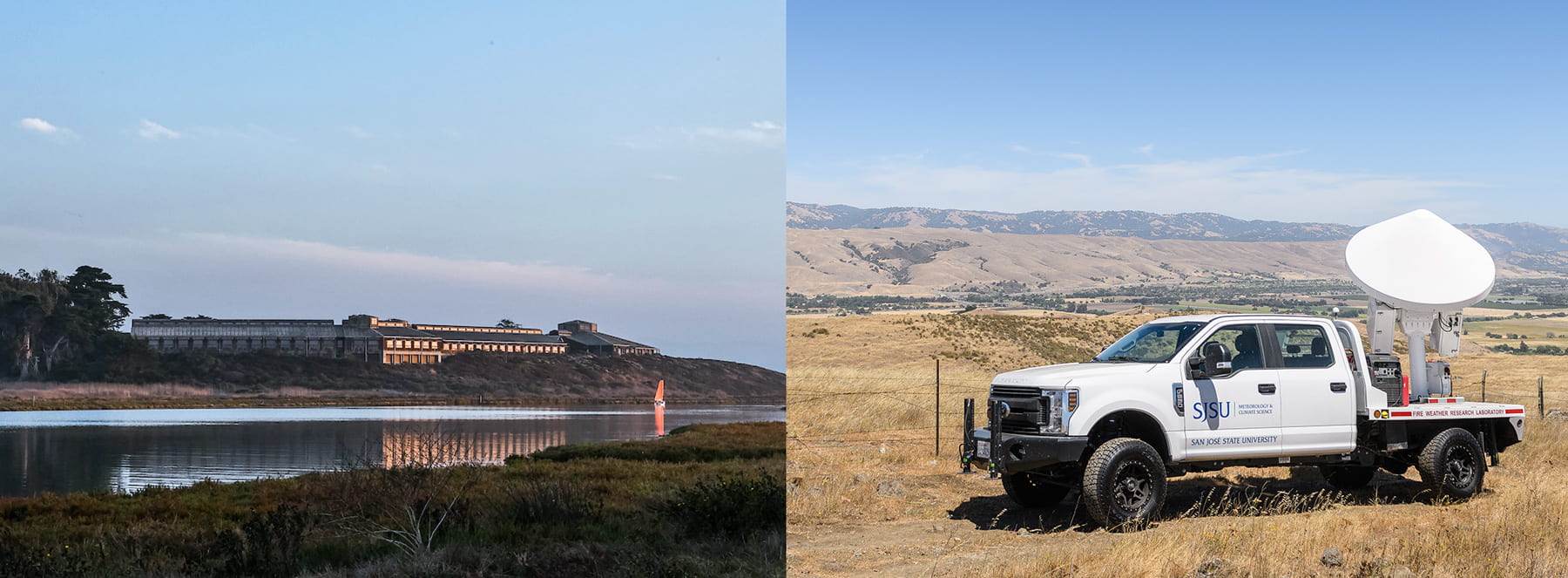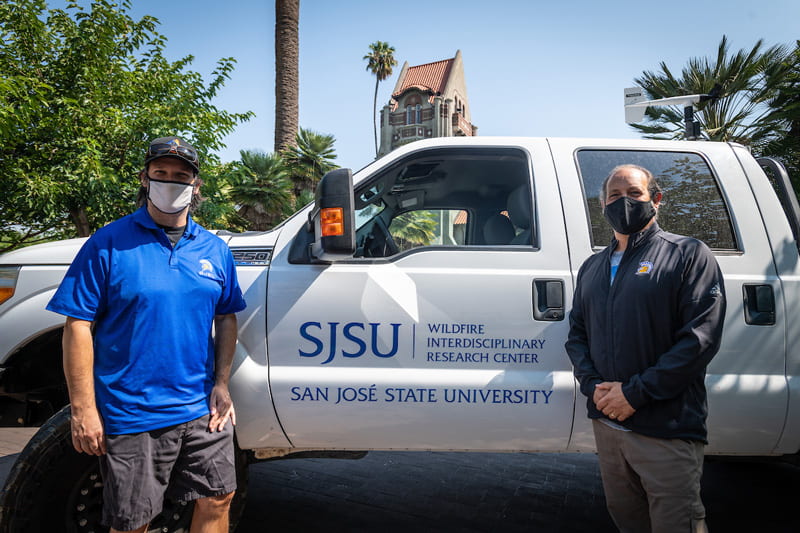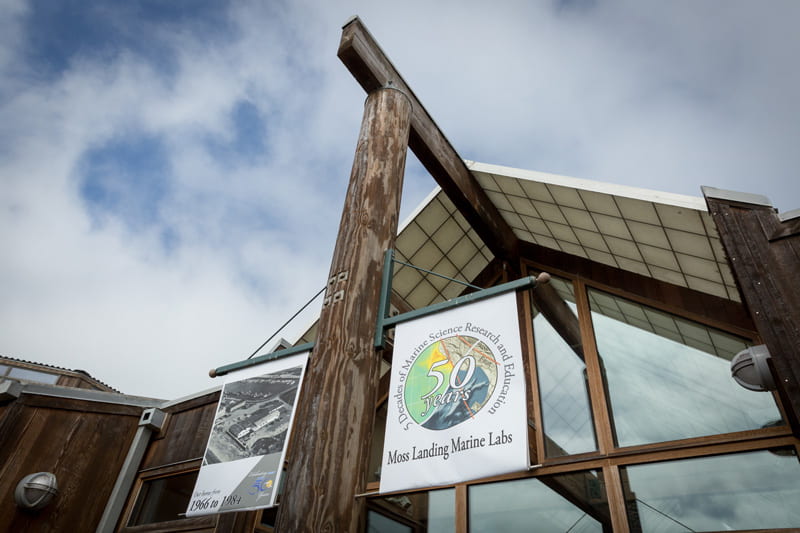More Than $8 Million in Critical Funding Allocated for SJSU’s WIRC and MLML

CA state budget funds, NSF grant will help with needed infrastructure improvements at key San José State University research facilities: Moss Landing Marine Laboratories in Moss Landing, CA (left) and SJSU’s Wildfire Interdiscipinary Research Center (WIRC). (Right) A research vehicle from WIRC in the field, San Jose, CA. Photos by Robert C. Bain.
Advocacy by elected officials in and around San José has recently led to more than $8 million in critical funding for San José State University’s Wildfire Interdisciplinary Research Center (WIRC) and Moss Landing Marine Laboratories (MLML), two of the university’s signature research facilities that each play important roles in addressing environmental matters and impacts of climate change.
Among other vital research, WIRC has quickly gained regional and national recognition for its role and expertise in understanding and mitigating near-term wildfire risks to lives and property. MLML, for its part, provides an unparalleled opportunity and environment for budding scientists to gain skills and training that prepare them to address societal needs related to marine issues.
In Governor Newsom’s recently-approved state budget, $5 million is allocated to the WIRC, the largest academic wildfire interdisciplinary research center in the country. Specifically, the funds will be used for a much-needed retrofit of the facility’s aging infrastructure as well as the construction of a new fire testing lab and other physical improvements.
The funding request was made by bill sponsor and longtime SJSU supporter Ash Kalra (D-San José), assemblymember for California’s 27th Assembly district.
“I am proud to champion this request for critical funds to modernize the laboratory space at the Wildfire Interdisciplinary Research Center (WIRC),” said Assemblymember Kalra.
“As wildfire season increasingly becomes a year-long phenomenon and our state faces the effects of climate change and drought conditions, it is vital that San José State University’s WIRC has the updated tools to provide wildfire predictions and monitoring with high-impact data.”
“This important funding will enable us to improve wildfire prediction and monitoring, not only in California, but around the United States,” said Craig Clements, professor of meteorology and director of the WIRC and the Fire Weather Research Laboratory.
“These essential investments into WIRC will provide new, next-generation tools for fire management and stakeholders, and ultimately increase resilience in our communities.”
Federal advocacy helps address wildfire, environmental and COVID-19 needs
Also in late June, U.S. Congresswoman Zoe Lofgren (CA-19) announced in a press release a $202,000 grant from the National Science Foundation (NSF) to SJSU to conduct research on wildfire behavior. “I’m proud of the groundbreaking work that SJSU and its Wildfire Interdisciplinary Research Center do to improve wildfire science and prediction tools,” said Rep. Lofgren.
“The research conducted with this funding will improve our understanding of how wildfires spread and will help save lives and property.”
“The NSF project will be a first in the U.S. and will provide funding for conducting field experiments and monitoring at understanding extreme fire spread in canyons,” added Clements.

Craig Clements (L), professor of meteorology and director of the WIRC and the Fire Weather Research Laboratory, and SJSU College of Science Dean Michael Kaufman (R). Photo by Robert C. Bain
As well as being the largest academic wildfire interdisciplinary research center in the country, WIRC is also home to the only meteorological team in the U.S. that is certified by CalFire. WIRC researchers are regularly deployed to major wildfires around the state and collect critical data that lead to high-resolution fire predictions using WIRC modeling.
Rep. Lofgren also recently announced a grant that will allow SJSU researchers to examine the effect of environmental change on genetic mutations and evolution. Specifically, more than $180,000 from the National Institute of General Medical Sciences will help fund research by SJSU’s Sonia Singhal.
A steady and consistent advocate for federal funding of scientific research and for San José State University, Rep. Lofgren’s latest efforts build on her successful wildfire research advocacy as well as nearly $111 million in COVID-19 relief funding she secured for SJSU in 2020-2021.
Dock refurbishment aids research vessels at Moss Landing
SJSU’s Moss Landing Marine Laboratories, meanwhile, also got the attention of Governor Newsom’s office, largely thanks to the efforts of Mark Stone (D-Monterey Bay), assemblymember for the state’s 29th Assembly district.
Stone sponsored a bill that led to a $3 million earmark in Governor Newsom’s state budget, one to help fund enhanced infrastructure for MLML’s oceanic research. Specifically, the funds will go toward the refurbishment of Del Mar wharf, the dock where its research vessels tie-up.
The vessels provide teaching experiences for MLML research students and staff, and serve as a platform where global collaborations and research operations occur. The dock is also available to external organizations, making it an important economic development asset for the surrounding community.

SJSU’s Moss Landing Marine Laboratories is the beneficiary of a $3 million earmark in the state budget that will help support the lab’s oceanic research. Photo by David Schmitz.
“The health of our oceans are a precursor to the health of the planet,” wrote Stone in his budget request. He noted MLML’s position as a leading teaching and research institution that advocates for sustainable ocean systems, one that educates the public on how the health of the oceans, coastlines and sea life directly affect society.
Once MLML secures permitting for its dock retrofit, the lab hopes to secure a new vessel to conduct research. A long-term aspiration is funding for an academic village to create an integrated experience for faculty and graduate students in proximity to the research facility, as well as provide them affordable housing.
“This funding is vital for the maintenance and growth of our facilities,” said Ivano Aiello, MLML’s interim director.
“Many of the infrastructure improvements we’ll be able to make will be devoted to climate change research such as ocean acidification, threatened marine species, rising sea levels and food sustainability through aquaculture and fisheries management. We’re grateful for the state funding and for Assemblymember Stone’s support.”
Related Stories

More than 4,000 Spartans Graduate This Fall

Lucas College and Graduate School of Business Ranked Among Top Online MBA Programs for Second Consecutive Year

Madison Wilber, Coming to You Live From SJSU

